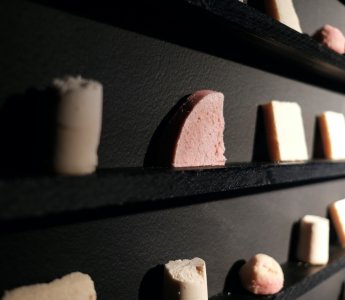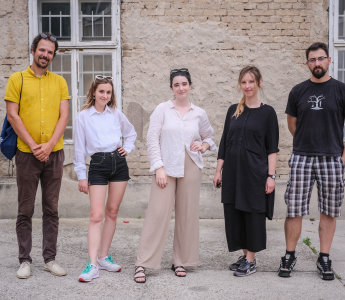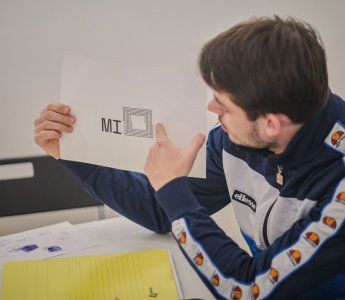Short Circuit is an educational project that connects art students with students from natural and humanistic science backgrounds. Practical thematic workshops, lectures and discussions provide the students with basic know-how and skills to approach researching artistic practices. With the goal of interdisciplinary education and emphasizing the value of cross-sector collaboration, the project gathers students for an intense team effort that follows the development of the artistic production; from the concept, follow through of the project and gathering documentation to setting up an exhibition and interpreting and writing curatorial texts. The point of the project is exactly an uninhibited research that offers participants a new perspective on already well-established methods while also leaving room for creativity in solving problems.
By holding a presentation of good practice examples that combine technology and art, KONTEJNER marks a beginning of practical work with young people, introducing them to the possibilities of cross-sectoral work. For young people who have not yet encountered works of art characterized by extensive scientific research, experimentation and close collaborative work with experts in the field of technology and science, the connection itself may not necessarily be immediately clear. Many of the artists that KONTEJNER represents are themselves for example engineers, biologists or programmers. In this way participants can already see their role in the creation of the work by recognizing themselves in the process required to achieve interdisciplinary work.
Young people should be provided a structured form of transferring practical knowledge as well as skills that can only be acquired through education, experience and exercise in order to better cope with the tasks that await them in the context of teamwork. Mentors play a big role during the project. The lack of experience and practical work in most participants manifests on one hand by a great fear of decision making and on the other, by a strong desire to try as many opportunities as possible. Mentors here provide the young people with guidance, stability in decision making and a sense of security in every further step to complete the cooperation. In addition, an important part of the project is the realization of a common workspace that serves as a temporary group studio and allows for continuous work on the concept of the project, research and presentation of the joint work. Young people in collaboration with the mentors prepare a prototype of a hybrid artwork based on the knowledge of all the participants.
The individual approach has, not surprisingly, proved to be the best for educating young people in the context of new and unknown forms of work. One of the most important long-term goals of the project was to create connections among young people that will continue after graduation making it easier for them to find future collaborators for cross-sectoral work at any level. The project still connects all the participants involving mentors, leaders, the partner representatives and the students, allowing for a quality exchange of ideas, skills and finally the creation of a long-term collaboration.
The participants of the project have been students of the Academy of Fine Arts, the Faculty of Philosophy from the Department of Art History, the Faculty of Electrical Engineering and Computing and the Department of Biology from the Faculty of Science.
The project has so far been presented at the Museum of Contemporary art in Zagreb, the Long Night of Museums at the Faculty of Electrical Engineering and Computing in Zagreb, the Šira Gallery in Zagreb, the Museum of Modern and Contemporary art in Rijeka, Pogon Jedinstvo - Zgreb Centre for Independent Culture and Youth, the UR Institute in Dubrovnik and the University Sjever in Koprivnica.
The participants of the project Short Circuit were awarded the Rector’s Award for achievements on the project and laying the foundations for future cross-sectoral cooperation.
Temporary studio:
Zagreb: 22nd November - 11th December 2018., Gallery Šira, Preradovićeva 13
Zagreb: 28th April - 10th June 2019., Gallery Miroslav Kraljević, Pavla Šubića 29
Zagreb: 6th March - 16th March 2020., Gallery Šira, Preradovićeva 13
Project presentation:
Zagreb: 20th December, Museum of Contemporary Art, Avenija Dubrovnik 17
Rijeka: 29th January 2019., Museum of Modern and Contemporary Art, Krešimirova 26c
Zagreb: 1st February 2019., Faculty of electrical engineering and computing, Unska ulica 3
Koprivnica: 12th June 2019., Sjever University, Trg dr. Žarka Dolinara 1
Dubrovnik: 16th August 2019., UR Institute, Put od Republike 14
Zagreb: 9th October, Pogon Jedinstvo, Trnjanski nasip, 12. Clubture forum
Project by: KONTEJNER | biro suvremene umjetničke prakse, Zagreb
Project coordinator: Klara Petrović
Mentors: Iva Ćurić, Tvrtko Mandić, Igor Brkić, Luja Šimunović, Vesna GulinParticipants:Sara Ančić, Lorena Barić, Sara Brašnović, Filipa Bobinac, Katarina Bogataj, Filip Bosnar, Mihaela Bošnjak, Klara Burić, Andrea Cihlar, Robert Čiček, Josip Drdić, Lora Elezović, Magdalena Komar, Janko Matošević, Jurica Mlinarec, Marianna Nardini, Matej Nišević, Tina Petković, Matija Plavčić, Tara Beata Racz, Laura Stojkoski, Adriana Sudarić, Jelena Šimundić Bendić, Petra Tramontana, Mihaela Zajec.
Program collaboration: Tomislav Jagušt (FER), Jasna Galjer (FF), Korana Littvay (ALU), Maja Zebec (ALU), Ana Kovačić (GMK), Jadrana Ćurković
Partners: Faculty of Humanities and Social Sciences, Zagreb, Faculty of Electrical Engineering and Computing, Zagreb, Academy of Fine Arts, Zagreb, Faculty of Science, Zagreb,
Organizational team: Klara Petrović, Luja Šimunović, Iva Ćurić, Tvrtko Mandić, Igor Brkić, Vesna Gulin, Jurica Mlinarec, Ena Hodžić, Tomislav Jagušt, Jasna Galjer, Maja Zebec, Korana Littvay
Photo documentation: Sanjin Kaštelan
Video documentation: Zračni Aleks, Zlivan Gljivan
Thanks to: Ines Krasić, Maja Rožman, Sabina Salamon, Ana Kovačić, Maja Pavlinić, Gjino Šutić






